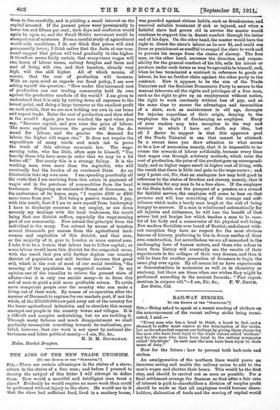THE AIMS OF THE NEW TRADE UNIONISM. [To THE EDITOR
Or THE " SPECTATOR."]
SIS,—There are certain advantages in the status of a slave; others in the states of a free man; and before I proceed to develop the subject of this letter I will attempt to define them. How would a merciful and intelligent man treat a slave ? Evidently he would require no more work than could be performed without injury to the slave. He would see to it that the slave had sufficient food, lived in a sanitary house,
was guarded against vicious habits, such as drunkenness, and received suitable treatment if sick or injured, and when a faithful slave had grown old in service the master would continue to support him in decent comfort through the latter end of his days. On the other hand, the master would have the right to direct the slave's labour as he saw fit, and could use force or punishment as needful to compel the slave to work and to prevent his escape from the status of slavery. The free man, on the other hand, assumes the direction and respon- sibility for the general conduct of his life, sells his labour or produce under such terms as maybe agreeable to himself, and, when he has terminated a contract in reference to goods or labour, he has no further claim against the other party to the contract. Now it appears to be the aim of the Trade Unionists and the Socialist Democratic Party to secure to the manual labourers all the rights and privileges of a free man, such as the right to give up an employment without notice, the right to work carelessly without loss of pay, and at the same time to secure the advantages and immunities of a slave, such as maintenance in old age, damages for injuries regardless of their origin, denying to the employers the right of discharging an employee. Many' of your readers may take exception to the way and manner in which I have set forth my idea, but all I desire to suggest is that this apparent goal of the Trade Unionist is one that cannot be attained. In a recent issue you drew attention to what seems to be a law of economics, namely, that it is impossible to in- crease the rewards of labour artificially, because every time that wages rise through arbitrary methods, which raise the cost of production, the price of the product goes up correspond- ingly, and so higher wages result in higher cost of living, with the result that there is little real gain to the wage-earner ; and may I point out, Sir, that an analogous law may hold good in reference to the status of freedom and slavery, namely, that it is impossible for any man to be a free slave. If the employer or the State holds out the prospect of a pension as a reward for faithful service, the employee will come to lean on that promise and will lose something of the courage and self- reliance which make a hardy man laugh at the risk of being hungry to-morrow. If a man is reimbursed automatically for all injuries and sicknesses, he will lose the benefit of that severe but yet benign law which teaches a man to be care- ful of his body and a conservator of his physical well-being. Few modern Socialists ever heard of Bastiat, and almost with- out exception they have no respect for the most obvious lessons of history, preferring to live in dream castles of their own construction, but nevertheless we are all enmeshed in the unchanging laws of human nature, and those who refuse to learn from history will eventually see the results of their experiments in the collapse of their rosy dreams, and then it will be time for another generation of dreamers to begin the same play over again. By all means let us have experiments or demonstrations in economics as well as in chemistry or anatomy, but there are times when one wishes they might be performed according to the ancient formula: "Fiat experi- mentum in corpore viii."—I am, Sir, &c., F. W. SMITH. Los Gatos, Cal.






































 Previous page
Previous page